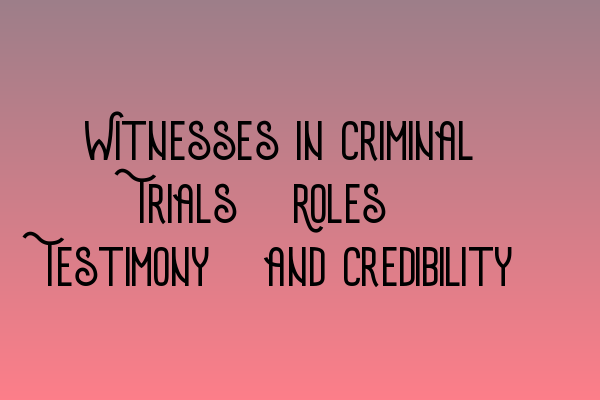Witnesses play a crucial role in criminal trials, providing testimony that can make or break a case. Their words and credibility can significantly impact the outcome of a trial, making it essential for lawyers and legal professionals to understand the roles witnesses play, the types of testimony they offer, and how their credibility is evaluated.
Roles of Witnesses
In a criminal trial, witnesses have various roles, each contributing to the search for truth and justice. These roles include:
- Eyewitnesses: Eyewitnesses are individuals who have personally observed a crime or the events surrounding it. Their role is to provide a firsthand account of what they saw, heard, or experienced. Eyewitness testimony can be powerful evidence in a criminal trial, as it can corroborate or contradict other pieces of evidence.
- Expert Witnesses: Expert witnesses are individuals with specialized knowledge and expertise in a particular field relevant to the case. They are called upon to provide opinions, interpretations, or explanations on complex matters that laypeople may not understand. Expert witnesses can provide scientific, technical, or professional opinions to help the court understand the evidence presented.
- Character Witnesses: Character witnesses testify about the defendant’s character, reputation, or moral standing. Their role is to provide information that may shape the court’s perception of the defendant’s personality, trustworthiness, or propensity to engage in criminal behavior. Character witnesses can include friends, family members, colleagues, or others who have interacted with the defendant in various contexts.
- Support Witnesses: Support witnesses are individuals who may not have witnessed the crime directly but can provide relevant information or support to the case. They may confirm an alibi, provide a timeline of events, or offer insight into the defendant’s behavior before or after the incident. Support witnesses can include friends, neighbors, or anyone who can provide relevant information to support the prosecution or the defense.
These different types of witnesses offer unique perspectives and contribute to the overall understanding of the case.
Testimony in Criminal Trials
Testimony is the verbal or written statement given by a witness under oath in a courtroom. Witnesses provide testimony to describe what they observed, heard, or experienced. This testimony is vital in establishing the facts of the case and influencing the judge or jury’s decision.
In a criminal trial, witnesses may be called to offer:
- Direct Evidence: Direct evidence is evidence that directly proves or disproves a fact. It is based on personal knowledge and firsthand observations. Eyewitness accounts, surveillance footage, or physical evidence are examples of direct evidence. It can be particularly compelling in establishing the defendant’s guilt or innocence.
- Circumstantial Evidence: Circumstantial evidence is evidence that indirectly infers a fact. It is based on inferences drawn from various facts or circumstances surrounding the case. While circumstantial evidence does not directly prove guilt or innocence, it can still be persuasive when combined with other evidence. For example, fingerprints at the crime scene or a motive for the crime can be considered circumstantial evidence.
Both direct and circumstantial evidence can be powerful tools in building a case, and witnesses play a crucial role in presenting and interpreting this evidence.
Evaluating Witness Credibility
Assessing a witness’s credibility is a crucial task for legal professionals involved in a criminal trial. The credibility of a witness determines how much weight their testimony carries and whether it will be believed by the judge or jury. Several factors are considered when evaluating witness credibility:
- Demeanor: The witness’s demeanor, including their body language, tone of voice, and overall behavior, can affect their credibility. A witness who appears composed, honest, and consistent is generally seen as more reliable.
- Consistency: Consistency in testimony is crucial for witness credibility. Inconsistencies or contradictions in a witness’s statements can cast doubt on their truthfulness.
- Corroboration: Corroborative evidence or testimony from other witnesses can strengthen a witness’s credibility. If multiple witnesses provide similar accounts, it can enhance the overall reliability of their testimony.
- Personal Bias: Identifying any personal bias or motive a witness may have is crucial in assessing credibility. A biased witness may have a vested interest in the outcome of the case, making their testimony less reliable.
- Prior Criminal Record: A witness’s criminal record, if any, can impact their credibility. A prior conviction for dishonesty or a history of false statements can diminish their reliability as a witness.
Evaluating a witness’s credibility requires careful consideration of these factors and assessing the overall likelihood of their testimony being truthful and accurate.
Understanding the roles witnesses play, the types of testimony they offer, and how their credibility is evaluated is vital for legal professionals involved in criminal trials. By understanding and presenting witnesses effectively, lawyers can enhance their chances of obtaining a favorable outcome for their clients.
For more information related to criminal law and practice, check out our related articles:
